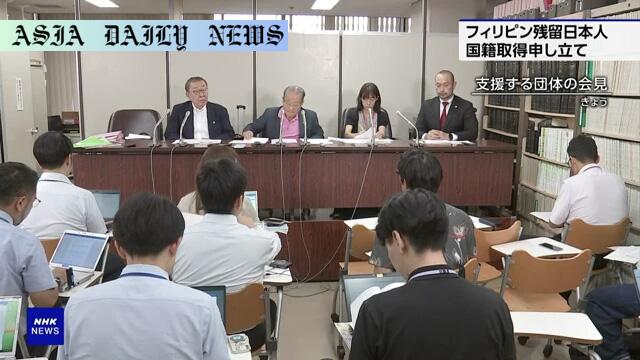Japanese citizenship – Four individuals of Japanese descent in the Philippines file lawsuits seeking citizenship, relying on DNA evidence.
Four people of Japanese descent left behind during WWII file citizenship claims in Japanese courts.
DNA evidence and supporting materials are aiding efforts to prove Japanese lineage.
More than 50 individuals in the Philippines still seek recognition of their Japanese heritage.

Introduction
In the aftermath of World War Two, many individuals of Japanese descent found themselves forgotten, stranded, or lost amidst geopolitical tensions and societal breakdowns. Eighty years later, a heartening yet challenging pursuit for identity, belonging, and legal rights continues. Four elderly individuals in the Philippines, of Japanese descent, have recently embarked on this journey to claim their rightful citizenship through the Japanese family courts.
The Historical Context
Before World War Two, several Japanese immigrants had relocated to the Philippines, drawn by economic opportunities. This led to the establishment of families, often with Filipino spouses, symbolizing cross-cultural harmony during peacetime. However, the war brought turmoil, forced separations, and chaos. Japanese fathers, in many cases, were forcibly repatriated or killed, resulting in their children being left behind, stateless and with scant documentation. Many such children faced systemic neglect, struggling their entire lives to prove their lineage.
Current Developments
Four individuals, aged between 79 to 82, have now taken their case to family courts in Japan’s Okinawa and Tokyo Prefectures. Backed by a support group committed to righting historical wrongs, these plaintiffs are utilizing DNA analyses, testimonies, and records to substantiate their blood ties. The supporting group has played an instrumental role, ensuring these individuals have access to the tools and evidence required. Their efforts are underscored by urgency, as the average age of such individuals stands at 83 years. Legal delays in this matter could mean many claimants leave this world without ever seeing justice or acknowledgment of their heritage.
The Broader Picture of Citizenship Claims
While these four cases make the headlines, they represent only a fraction of the more considerable issue. Reports indicate that approximately 50 similar individuals in the Philippines are still pursuing recognition of their Japanese descent and subsequent citizenship rights. Furthermore, since the initiation of such claims, Japanese family courts have granted citizenship to over 320 people, signaling progress but underlining the complexity of these cases. Gathering evidence to establish familial ties without official, war-time records or verifiable documents remains the primary challenge. Some individuals, like 82-year-old plaintiff Takei Jose, who will soon meet relatives in Osaka, must undertake emotional journeys to piece together fragmented familial histories.
The Role of Advocacy Groups
Advocacy organizations remain at the forefront of these efforts, using science, particularly DNA testing, to bridge evidentiary gaps and uphold justice for the claimants. Their work ensures these claimants – many of whom face unique challenges due to language barriers, advanced age, and economic conditions – have a fighting chance at recognition. These organizations emphasize the need for expedited processes, suggesting that prolonged delays equate to further denial of justice to these aging claimants.
The Personal Impact
For many involved, the pursuit of Japanese citizenship is more than a formal gesture. It’s a validation of identity and heritage that extends far beyond legal documentation. For individuals like Takei, who will reconnect with relatives and a home nation he’s only ever known through stories, this legal acknowledgment holds emotional, personal, and historical significance.
Conclusion
The fight for citizenship by descendants of Japanese immigrants in the Philippines is a testament to resilience. These ongoing cases highlight the importance of addressing historical injustices and ensuring forgotten populations receive recognition and rights. Although the road is fraught with difficulties stemming from lost documentation and decades-long delays, every victory reaffirms the importance of preserving identity and rectifying historical injustices, even generations later.



Commentary
Struggles of Identity and Belonging
The pursuit of Japanese citizenship for the descendants left behind in the Philippines after World War Two isn’t just a matter of legality—it is deeply rooted in cultural identity and personal dignity. Imagine dedicating your life to seeking acknowledgment of your heritage, only to encounter endless obstacles in the form of lost documents and bureaucratic delays. This story resonates profoundly, highlighting the resilience of these individuals to reclaim what has always been rightfully theirs.
The Role of Advocacy and DNA Evidence
The role of advocacy groups in this struggle cannot be understated. By employing DNA evidence, these organizations have provided a lifeline for claimants whose only proof of lineage might otherwise have been anecdotal. It demonstrates the power of science and technology in addressing systemic failures, but it also reflects a bittersweet reality—that justice delayed is often justice denied. These efforts are commendable, but they raise questions about how the global community acknowledges and repairs damages caused by historical events.
The Human Impact Beyond the Legal Fight
While the legal battle for citizenship is essential, the human stories behind these efforts are immeasurable. Hearing about individuals like Takei Jose, who will soon meet relatives in Japan, reminds us of the innate yearning to connect to one’s roots. These personal journeys evoke empathy and underscore the need for timely intervention as these claimants, now elderly, have limited time to see the fruits of their perseverance.
A Call to Expedite Justice
This story serves as a powerful reminder of the importance of addressing historical wrongs without procrastination. Governments and institutions must expedite their efforts to ensure these individuals receive the acknowledgment they deserve. It’s a collective responsibility to ensure that future generations do not inherit the same challenges and that they live in a world where cultural heritage is honored and preserved without contest.